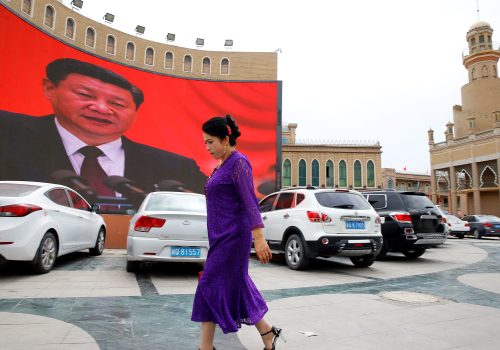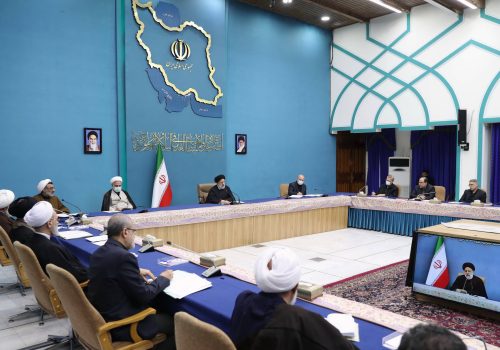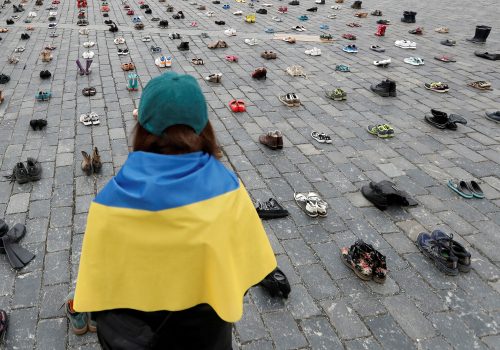Strategic Litigation Quarterly Newsletter: Exploring new and existing paths toward accountability
Subscribe
Through the application of legal tools, we at the Strategic Litigation Project (SLP) work on the prevention of and accountability for atrocity crimes, human rights violations, terrorism, and corruption offenses around the world.
In recent months, our team welcomed new members; launched new campaigns and initiatives to hold government actors accountable in Iran, Afghanistan, Syria, and China; and expanded our work in Latin America.
Looking ahead, we’re excited about the continued growth of an archive documenting open-source evidence of human rights violations in Iran, built in collaboration with Berlin-based nongovernmental organization Mnemonic and other partners. We also look forward to reporting progress on our effort to include gender apartheid as a crime in the global crimes against humanity convention, which is currently being negotiated by United Nations member states. Finally, following a submission in July for the fourth cycle of the United Nations Universal Periodic Review (UPR) of China, we are ramping up efforts to engage with member states ahead of that UPR session.
Legal and policy interventions
SLP filed an amicus that could set a new judicial precedent in Latin America
In February, Nonresident Senior Fellow Nizar El Fakih and SLP Staff Lawyer Lisandra Novo submitted an amicus curiae brief to the Inter-American Court of Human Rights, the highest human rights tribunal in the Americas, with the aim of advancing a new judicial precedent in the region that ensures full individual accountability for crimes against humanity. Nizar and Lisandra argued that no reduction of criminal convictions can be made under “gradual prescription” or “half statute of limitations” to benefit individuals who have participated in crimes against humanity, even when such a benefit is established in domestic laws. The amicus brief was filed in the case Vega González and others v. Chile, a judicial dispute arising after the Supreme Court of Chile decided to apply such a benefit in favor of several individuals accused of crimes against humanity committed during the Chilean civil-military dictatorship in the 1970s.
Although the case is still pending before the Inter-American Court, the amicus brief is already having an impact. In July, in a separate case, the Chilean Supreme Court overturned a lower court decision applying the “half statute of limitations” to fourteen former operatives of Chile’s National Intelligence Directorate, arguing that such a decision was made, among other reasons, to further prevent Chile from being internationally responsible before the Inter-American Court, and it implemented part of the reasoning articulated by the SLP in the amicus brief regarding the international law and human rights standard that must be observed in these types of cases
Submission on reparations to UN special procedures
In March, the SLP team responded to a call for inputs from the UN special rapporteur on truth, justice, reparations, and guarantees of nonrecurrence regarding the financing of reparations owed to victims of human rights and humanitarian law violations. The SLP’s submission, co-authored by the Tahrir Institute for Middle East Policy, discussed the gap in reparations programs for Syrian victims and identified potential options for financing reparations or reparative measures for Syrian victims. The submission was informed by research and consultations the SLP is conducting with Syrian victims, survivors, and civil society on the need for reparative measures.
UPR China submission
In July, SLP Nonresident Senior Fellow Rayhan Asat submitted a comprehensive report on the human rights situation in Xinjiang for the fourth cycle of the UN UPR of China. The report highlighted the appalling abuses suffered by Uyghurs and other Turkic minorities. The report’s findings indicate that the Chinese government has failed to comply with the recommendations from the previous UPR cycle in 2018, as well as those presented in the Office of the UN High Commissioner for Human Rights assessment in August 2022. Rayhan followed up with a piece in the New Atlanticist about the submission and its significance amid a potential warming of US-China relations and the threat of minimization of human rights concerns.
Read more
Accountability and documentation efforts
In April, the SLP published its “Practitioner’s Manual” for holding the Islamic Republic of Iran (IRI) accountable for atrocity crimes through national prosecutions in European jurisdictions. The manual was compiled to aid practitioners and independent investigators in navigating the universal jurisdiction frameworks of European states with the highest likelihood of prosecuting Iranian human rights violators.
Read more
Focusing on five states—France, Germany, the Netherlands, Sweden, and Switzerland—the manual outlines the crimes and violations subject to universal jurisdiction, best practices for investigating and documenting crimes, and processes for requesting investigations and participating in prosecutions as a victim, witness, or nongovernmental organization. A Persian-language translation of the manual is forthcoming.
In addition to the tools provided in the practitioner’s manual, the SLP and its partners have initiated efforts to better document IRI abuses. Following the death of Mahsa Jina Amini at the hands of the IRI’s “morality” police and a subsequent nationwide uprising, protestors and citizen journalists have publicly shared videos and photographs of violent crackdowns on protests carried out by Iranian security forces. To preserve this information for future accountability efforts, the SLP team partnered with Berlin-based nongovernmental organization Mnemonic—along with the Promise Institute for Human Rights at the University of California, Los Angeles and the Iran Human Rights Documentation Center—to develop a digital archive of open-source information related to human rights violations committed over the course of the protests. We have since engaged partners at the Human Rights Center at the University of California, Berkeley and Bellingcat to advance this work. Information shared through social media channels can often be lost before accountability for the violations is possible. With the help of Mnemonic and the Iran Archive, we are ensuring that this information can be used as evidence in future accountability proceedings.
Advocacy
Pushing for gender apartheid to be recognized as a crime under international law
This quarter, the SLP has maintained an advocacy campaign to enshrine the concept of gender apartheid in international law, focusing on gender discriminatory laws and policies in Iran and Afghanistan.
In late May and early June, SLP Legal Consultant Britta Redwood moderated two consultations with members of civil society organizations and activists focused on human rights in Afghanistan and Iran. Held in partnership with Foley Hoag LLP, the consultations served to inform advocacy work on gender apartheid before the United Nations and national parliaments. As part of this effort, Britta drafted a written submission to be made before the UK Parliament with regard to codifying these crimes in international and domestic criminal law.
In July, Gissou traveled to Necker Island, at the invitation of Richard Branson of Virgin Group, to speak to a group of business leaders and philanthropists about the team’s work on legal accountability for gender crimes in Iran and Afghanistan and advancing the concept of gender apartheid. Soon after, she participated in roundtables before parliament in the United Kingdom and New Zealand as part of their inquiries into the issue and was interviewed by Holly Branson about the campaign.
Featured events
SLP team updates
In July, the SLP welcomed Joumana Seif as a nonresident senior fellow. Joumana is a Syrian lawyer and legal advisor for the International Crimes and Accountability program at the European Centre for Constitutional and Human Rights (ECCHR), where she focuses on Syria and sexual and gender-based violence. In her position with the ECCHR, she worked on the al-Khatib trial before the Higher Regional Court of Koblenz—the first trial worldwide on torture in Syria—closely supporting the survivors. With the SLP, she will support the team’s Syria accountability work.
In September, Alyssa T. Yamamoto joined the SLP as senior legal and policy advisor. Alyssa is a human rights lawyer who most recently served as legal advisor to the UN special rapporteur on counterterrorism and human rights, where her work focused on advising member states on human rights and gender mainstreaming in counter-terrorism and national security, and advocating for accountability for the systematic abuse of counterterrorism measures to target human rights defenders, civil society actors, and minority groups. Before the UN, Alyssa worked at an international law firm, where her representations involved proceedings before the International Court of Justice and UN human rights treaty bodies and special procedures, as well as plaintiff-side cases under the US Alien Tort Statute and Torture Victim Protection Act.
External media and outreach
- Rayhan Asat quoted in a Foreign Policy op-ed about the need for a strong human rights strategy in US China policy.
- Lisandra Novo spoke at a press conference about the downing of flight PS752 and the anticipated ICJ case.
- Gissou Nia quoted in the New York Times about the enforceability of the Putin arrest warrant.
- Rayhan Asat profiled in the New York Times about her fight to free her brother Ekpar from detention in Xinjiang.
- SLP deputy director Nushin Sarkarati spoke on a panel hosted by Georgetown Law’s Human Rights Institute as part of the US Summit for Democracy about the need for greater international accountability for attacks on journalists.
- Gissou Nia was interviewed by the Guardian about the launch of a campaign to codify gender apartheid under international law.
- Rayhan Asat gave keynote remarks at the SOAS Journal of Postgraduate Research’s SJPR Conference.
Further reading
Wed, Jul 26, 2023
Iran targeted human rights sanctions series: UK designates the Supreme Council of the Cultural Revolution
IranSource By Celeste Kmiotek, Lisandra Novo
The United Kingdom designated the Supreme Council of the Cultural Revolution and its new secretary, Abdol Hossein Khosrow Panah, on July 6.
Thu, May 25, 2023
How to hold the Assad regime accountable, even as countries normalize relations with Syria
New Atlanticist By Elise Baker
There remains a slate of accountability tools for Syria, and certain avenues for seeking accountability may even be expanding with normalization.
Fri, Feb 24, 2023
How legal actions against Russian aggression in Ukraine can serve as a model for other conflicts
New Atlanticist By Celeste Kmiotek, Lisandra Novo
There is an unprecedented number of investigations and accountability efforts under way in response to Russia's invasion. It's a sign of success—but it also shows how victims of international crimes have unequal access to justice.
Image: The Statue of Justice, depicted as a women with a sword in one hand and scale in her other, is seen on top of the London Central Criminal Court, the Old Bailey in London August 12, 2005. Britain may reform laws to ensure efforts to deport foreign nationals deemed a threat to national security, are not blocked by judges over human rights concerns. UNICS REUTERS/Russell Boyce RUS









